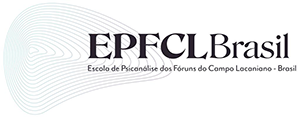O forçamento por onde o psicanalista pode fazer ressoar outra coisa
DOI:
https://doi.org/10.31683/stylus.vi27.734Keywords:
Psychoanalysis, interpretation, writing, poetic narrativeAbstract
The proposal of this paper is to articulate the consequences of the advances elaborated by Lacan in his later teaching, for the psychoanalytic experience. If the correspondence between language and the real is from the order of the impossible, if the integral transmission seems impossible, the crucial question is: What is the psychoanalyst’s ethical response when the destiny of the message becomes the ab-sens of the human sexual intercourse, which is not natural, but “taken by the words”? This is the clinical question and essential ethics: psychoanalysis does not seek so much the truth behind what it means, but the fact should “reveal itself” beforehand. For beyond the sense, the psychoanalyst echoes something else – claims Lacan in 1977. For this, it is necessary what he calls “forcing”, which refers to the analytical act as response, without which psychoanalysis can limp irreducibly to an “autism of two” (Lacan, 1977). Thus, it is necessary to blur the difference between truth and fiction since “what the patient says, expecting confirmation, is not the truth, but the variety of the symptom”. But, attention: this lack of pretension of the truth does not at all justify a relativism of deconstruction, since the all the “lying truths” point to the real that jouissance is the castration. Here is the clinic and ethical boldness Psychoanalysis offers: the bet on the well saying as the psychoanalyst’s response facing the impossible of saying everything that is expected from a clinic that includes pass. There where there is not the Other to answer, neither a subject that corresponds. There where there is not a postman of the truth there is, however, something that the letter carries: the sound value of the poetic function, which touches the real far beyond the semantic value of the truth – and that it makes it echo in the body (encore ). Those are the questions I intend to deal with in this paper.
Downloads
References
n. 3, 1996.
FISCHER, S. História da escrita. São Paulo: Unesp, 2009.
JAKOBSON, R. (1960). Linguística e poética. In: Linguística e comunicação. São
Paulo: Editora Cultrix, 1969, 118p.
KIBERD, D. Introdução (1922). In: Ulysses. São Paulo: Penguin Companhia, 2012.
LACAN, J. (1953). Função e campo da fala e da linguagem. In: LACAN, J. Escritos.
Trad. de Vera Ribeiro. Rio de Janeiro: Jorge Zahar Ed., 1998, pp. 238-324.
__________. (1957). A instância da letra no inconsciente ou a razão desde Freud.
In: LACAN, J. Escritos. Trad. de Vera Ribeiro. Rio de Janeiro: Jorge Zahar Ed.,
1998, pp. 496-536.
__________. (1959-60). O Seminário, livro 7: a ética. Rio de Janeiro: Jorge Zahar
Ed., 1988.
__________. (1961-62). O Seminário, livro 9: a identificação. Inédito.
__________. (1962-63). O Seminário, livro 10: a angústia. Rio de Janeiro: Jorge
Zahar Ed., 2005.
__________. (1972-73). O Seminário, livro 20: mais ainda. Trad. de M. D. Magno.
Rio de Janeiro: Jorge Zahar Ed., 1992. 209p.
__________. (1973). O Aturdito. In: LACAN, J. Outros escritos. Trad. de Vera
Ribeiro. Rio de Janeiro: Jorge Zahar Ed., 2003, pp. 448-497.
__________. (1975-76). O Seminário, livro 23: o sinthoma. Trad. de Sérgio Laia.
Rio de Janeiro: Jorge Zahar Ed., 2007, 249p.
__________. (1976-77). O Seminário, livro 24: l’insu que sait de l’une bévue s’aile
à mourre. Inédito.
__________. (1977-78). O Seminário, livro 25: momento de concluir. Inédito.
PACHECO, A. L. P. A lógica da interpretação. Stylus. Rio de Janeiro: Associação
Fóruns do Campo Lacaniano, n. 25, pp. 43-51, 2012.
RYUKO, O A arte da escrita chinesa e suas implicações pictóricas e poéticas. In:
Blog Dragon’s Quest, maio de 2007. Disponível em:
<http://demandadodragao.blogspot.com.br/2007_05_01_archive.html>, acesso
em 22 de julho de 2013.
Downloads
Published
How to Cite
Issue
Section
License
Ao encaminhar os originais, os autores cedem os direitos de publicação para STYLUS.
Os autores assumem toda responsabilidade sobre o conteúdo do trabalho, incluindo as devidas e necessárias autorizações para divulgação de dados coletados e resultados obtidos, isentando a Revista de toda e qualquer responsabilidade neste sentido.



